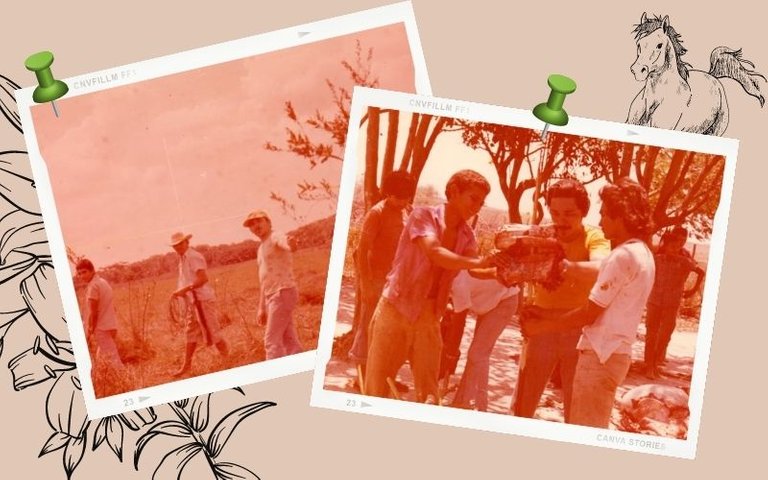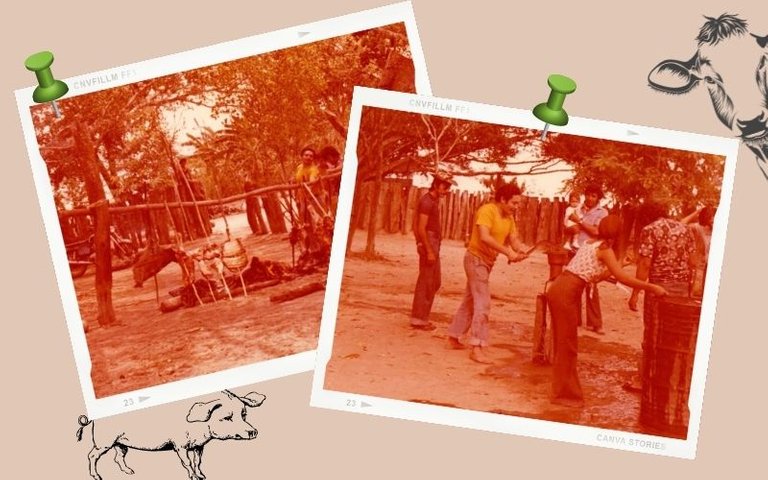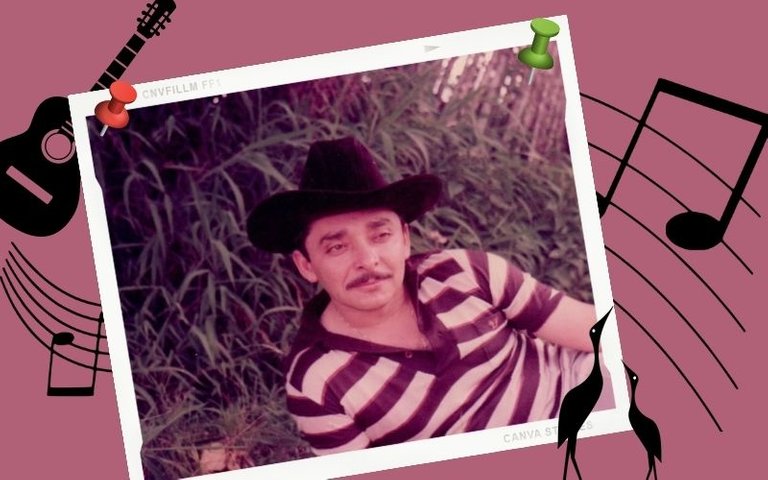
NOS VAMOS PARA EL PUEBLO
-¡Rondón! -Así llamaba mi madre a mi papá-, cómo vamos hacer para que Baudilio vaya a la escuela. Ese muchacho ya va a cumplir 12 años y todavía no sabe leer ni escribir. Ni siquiera conoce el abecedario. Las pocas letras que conoce son porque yo se las enseñé.
-Todos los muchachos de esta zona ninguno sabe leer y escribir. Contestó mi padre como buscando una justificación a la situación planteada por mi madre.
-Además, la escuela más cercana queda a medio día de camino a caballo.
-¿Y a pie? Preguntó mi madre.
-Saliendo a las seis de la mañana llegarían a las cuatro de la tarde, aproximadamente.
-Tenemos que buscar una alternativa, dijo mi madre, con cara de preocupación. Yo no quiero que mis hijos se queden brutos. Al menos deben aprender a leer y escribir, así pueden tener una visión más amplia del mundo y de la vida.
Estos diálogos los escuchaba varias veces en la semana. Unas veces en la mañana, otras a la hora del café después del almuerzo, cada uno sentado en una silla de madera de esas que se utilizan en el campo. A veces cuando teníamos una visita mi madre abordaba el tema buscando apoyo en ese amigo o amiga que la mayoría de las veces lo conseguía. También, cuando todos estábamos en el patio de la casa y bajo la luz de la luna, mientras nosotros jugábamos, mi madre, en un momento oportuno, sacaba el tema a colación.
-¿Para qué quieres tu que ese muchacho vaya a la escuela? Interroga mi padre.
-Yo creo que yendo a la escuela puede tener un futuro mejor que el de nosotros, hasta puede ser maestro de una escuela, tener un negocio, tener un trabajo diferente a “jalar pala y machete, trabajo de llano”. Me entristece pensar que cuando cumpla 18 años se vaya a trabajar a uno de esos hatos grandes de obrero, como hacen todos los muchachos de por aquí.
-La solución que yo veo es mudarnos para el pueblo –dijo mi padre.
-Papá - pregunté enseguida-, si nos vamos me puedo llevar todas mis cosas?
-No hijo, respondió.
-Esas las dejas para cuando vengas de vacaciones.

Cuando regresé, después de casi 10 años de ausencia, la casa no estaba en el mismo sitio, la habían cambiado de ubicación. Estaba bien distante de la laguna y ésta el verano la estaba consumiendo. Me dió tristeza verla moribunda. El claro cristalino que antaño era parte de su belleza y esplendor, ahora convertido en un vulgar charco invadido por los cochinos para refrescarse. Ninguna ave estaba presente. Los árboles frutales lucían abandonados y aun así ofrecían sus frutos en menor cantidad pero conservando el sabor y la dulzura. Mis cosas, las que había dejado guardadas, ni rastro de ellas. Los animales tampoco. Lloré.
Confieso que cuando mi padre planteó lo de mudarnos para el pueblo sentí miedo, tristeza; el corazón me empezó a latir aceleradamente. En ningún momento me produjo alegría. Sentí miedo al imaginarme viviendo en una situación completamente diferente al confort de donde nací y me crie. Comencé a crear imaginariamente escenarios que fortalecían mis sentimientos de miedo por vivir situaciones nuevas para mí. La mayoría de esas preocupaciones nunca ocurrieron en el futuro.
La tristeza era por las cosas que tenía que dejar: la silla de montar con sus aperos, el mandador que utilizaba para arrear los becerros y los cochinos, un caballo manso que me había asignado mi papá, el burro también manso con el que iba a llevar o traer alguna cosa a la casa de los vecinos. Por cierto, los más cercanos quedaban como a tres ó más kilómetros de distancia. Los demás vecinos como a una hora de camino a caballo.
Con la ayuda de mi mamá, de mis tres hermanas menores y de un obrero que siempre había en la casa sembramos varios árboles frutales alrededor de la cerca de alambres que protegía la casa. Todo indicaba que pronto tendríamos una abundante cosecha de guanábana, naranjas, mangos, guayaba, limón, limón dulce, lechosa, guama de castilla. Hasta un merecure. Lo doloroso y triste para mí era que no iba estar presente cuando todas esas frutas estuvieran listas para consumir, después de tanto tiempo cuidándolas, regándolas con amor para que crecieran hermosas y pródigas en frutos.
Esa noche casi no dormí. Cerraba los ojos y me veía sentado en el barranco mas alto de la laguna que quedaba a pocos metros de la casa, desde donde extasiado observaba las distintas aves que llegaban en busca de alimento, pintando un cuadro multicolor alrededor del claro cristalino de la laguna, completado por el jardín de flores que algunas plantas acuáticas exhibían orgullosas. En la vida real esa era mi principal diversión: contemplar las bandadas de corocoras, de garzas blancas, de patos guiriries cuando llegaban a la laguna. Recuerdo que de vez en cuando venía de visita un garzón soldado y se ubicaba en la parte más distante de la casa. En mi diálogo interno me decía: llegó el hombre de liquilique blanco.
-Mamá usted puede ser maestra, Ud. sabe leer y escribir. Con los muchachos de los Arévalo, los de la Perla, los que hay en Buron y nosotros puede abrir una escuela. Le propuse a mi madre con la esperanza de quedarnos.
-No hijo, yo no puedo. Yo solo tengo segundo grado, el tercero no lo terminé porque el maestro no volvió a la escuela y para ser maestro hay que tener sexto grado aprobado.
Con la respuesta de mi madre se me complicó de nuevo la situación. Yo estaba creyendo que la escuela consistía en aprender a leer y escribir. Seis años estudiando es mucho tiempo, me repetía mentalmente.
Una tarde cuando el “sol de los venados” nos regalaba un hermoso atardecer, mi papá le dijo a mi madre:
-Arréglame la maletera con ropa para cinco días. El lunes me incorporo, junto con Pablo Márquez, contratados por un comprador de ganado para arriar un lote grande de ganado hasta Guasdualito. Voy aprovechar el viaje para buscar una casa allá. Instintivamente miré a mi madre y observé en su rostro una sensación de satisfacción y en seguida agregó:
-¡Ojala sea cerca de la escuela!.

Mi padre regresó a los siete días. Salimos todos a recibirlo como siempre lo hacíamos. Después del saludo, el abrazo y pedirle la bendición, me pasó el “pollero” donde traía el pan. Para nosotros era motivo de gran alegría. Con un pedazo de pan en la mano pregunté:
-¿Papá consiguió la casa?
-Si, hijo.
-¿Cerca de la escuela? –Intervino mi madre-.
-Sí, respondió mi padre. Y agregó: como a cinco minutos de escuela, a la entrada del Barrio Los Corrales. Dentro de 15 días viene un señor con una camioneta doble tracción para hacer la mudanza.
Sentí que el corazón se me puso chiquitico y acelerado. Esa noche casi no dormí. La preocupación innecesaria por acontecimientos imaginarios sobre el futuro me quitaba el sueño. Lo peor de todo es que los pensamientos y las imágenes que creaba en su mayoría eran negativos. Parecía que en mi mente no había espacio para lo positivo.
Llegó el día previsto para la mudanza. Cuando arrancó el carro me quedé enmudecido por el llanto interno, viendo que se iba quedando a la distancia el hogar donde cultivé tantas vivencias infantiles que hoy perduran en mi vida como gratos recuerdos.
English version

WE'RE GOING TO THE TOWN
-Rondón! -That's what my mother used to call my dad-, how are we going to get Baudilio to go to school? That boy is about to turn 12 and he still doesn't know how to read or write. He doesn't even know his alphabet. The few letters he knows are because I taught him.
-All the boys in this area, none of them know how to read and write. My father answered as if looking for a justification for the situation raised by my mother.
-In addition, the nearest school is half a day away on horseback.
-And on foot? my mother asked.
- Leaving at six in the morning, they would arrive at approximately four in the afternoon.
-We have to look for an alternative, my mother said, with a worried face. I don't want my children to be gross. They should at least learn to read and write, so they can have a broader view of the world and life.
I listened to these dialogues several times a week. Sometimes in the morning, sometimes at coffee time after lunch, each one sitting on a wooden chair, one of those used in the fields. Sometimes when we had a visit my mother approached the subject looking for support in that friend or friend who most of the time got it. Also, when we were all in the patio of the house and under the moonlight, while we were playing, my mother, at an opportune moment, would bring up the subject.
- Why do you want that boy to go to school? Question my father.
-I think that by going to school he can have a better future than ours, he can even be a school teacher, have a business, have a different job than “pulling a shovel and machete, working on the plain”. It saddens me to think that when he turns 18 he will go to work in one of those big labor herds, like all the boys around here do.
-The solution that I see is to move to the town –said my father.
"Dad," I asked right away, "if we go, can I take all my things?"
"No son," he answered.
-You leave those for when you come on vacation.

When I returned, after almost 10 years of absence, the house was not in the same place, it had been moved. It was well away from the lagoon, and in the summer it was consuming.
It made me sad to see her dying. The crystal clear that was once part of its beauty and splendor, now turned into a common puddle invaded by pigs to cool off. No bird was present. The fruit trees looked abandoned and even so they offered their fruits in less quantity but conserving the flavor and sweetness. My things, the ones I had left stored, not a trace of them. Neither do the animals. I cried.
I confess that when my father raised the idea of moving to the town I felt fear, sadness; my heart started beating fast. It never made me happy. I felt fear imagining living in a completely different situation than the comfort of where I was born and raised. I began to imagine scenarios that strengthened my feelings of fear of living situations that were new to me. Most of those concerns never occurred in the future.
The sadness was because of the things I had to leave behind: the saddle with its tools, the boss I used to herd the calves and pigs, a gentle horse that my father had assigned me, the also gentle donkey with which I was going to take or bring something to the neighbors house. By the way, the closest ones were three or more kilometers away. The other neighbors about an hour away on horseback.
With the help of my mother, my three younger sisters and a worker who was always in the house, we planted several fruit trees around the wire fence that protected the house. Everything indicated that we would soon have an abundant harvest of soursop, oranges, mangoes, guava, lemon, sweet lemon, papaya, guama de Castilla. Even a merecure. The painful and sad thing for me was that I was not going to be present when all those fruits were ready to eat, after taking care of them for so long, watering them with love so that they would grow beautiful and abundant in fruit.
That night I hardly slept. I closed my eyes and saw myself sitting in the highest ravine of the lagoon that was a few meters from the house, from where I ecstatically observed the different birds that arrived in search of food, painting a multicolored picture around the crystalline clear of the lagoon, completed by the flower garden that some aquatic plants proudly displayed. In real life that was my main entertainment: watching the flocks of corocoras, white herons, guiriries ducks when they arrived at the lagoon. I remember that from time to time a soldier guard would come to visit and would be located in the most distant part of the house. In my internal dialogue I told myself: the man in white liquilique arrived.
-Mom, you can be a teacher, you know how to read and write. With the boys from the Arévalos, the ones from La Perla, the ones from Buron and us, he can open a school. I proposed to my mother hoping to stay.
-No son, I can't. I only have second grade, I didn't finish the third because the teacher didn't go back to school and to be a teacher you have to have passed sixth grade.
With my mother's response, the situation became more complicated for me. I was thinking that school was about learning to read and write. Six years studying is a long time, I repeated to myself.
One afternoon when the "sun of the deer" gave us a beautiful sunset, my father told my mother:
-Fix my trunk with clothes for five days. On Monday I join, along with Pablo Márquez, hired by a cattle buyer to herd a large batch of cattle to Guasdualito. I'm going to take advantage of the trip to look for a house there. Instinctively I looked at my mother and saw a sense of satisfaction on her face and immediately she added:
-I hope it's close to the school!

My father returned after seven days. We all went out to greet him as we always did. After the greeting, the hug and asking for his blessing, he handed me the “pollero” where he brought the bread. It was a source of great joy for us. With a piece of bread in hand I asked:
-Dad got the house?
-Yes son.
-Close to the school? My mother intervened.
"Yes," answered my father. And he added: about five minutes from school, at the entrance of Barrio Los Corrales. Within 15 days a man comes with a four-wheel drive truck to make the move.
I felt my heart become small and accelerated. That night I hardly slept. Unnecessary worry about imaginary events in the future kept me up at night. Worst of all, the thoughts and images I created were mostly negative. It seemed that in my mind there was no room for the positive.
The day scheduled for the move arrived. When the car started I was left speechless by internal tears, seeing that the home where I cultivated so many childhood experiences that today remain in my life as pleasant memories was staying in the distance.
🔼 Banner hecho en / Banner made in canva.
🔽 Texto traducido en / Text translated in Deepl.
Me encanta tu historia, para mí el llano es símbolo de alegría, mi mamá es llanera y crecí visitando la casa de mis abuelos en el llano venezolano, sus esteros me atrapaban, sus historias y leyendas me emocionaban. Todo lo que tiene que ver con el llano me apasiona las canciones de Reynaldo armas y Simón Díaz , el café recien colado, ya perdí la cuenta de las veces que he leído Doña Bárbara porq cada vez que lo hago entro al llano y camino junto a Maricela por esos caminos polvorientos y descanso en una hamaca debajo de una buena sombra. Que linda historia y bueno esperamos ver qué pasó cuando llegaste al pueblo.
Muchas gracias por su alentador comentario. Respondo con aires de la sabana y alumbrados por la luna que nos da luz como si fuera de día. Me agrada ese amor por el llano que ud. manifiesta que es como descansar en una hamaca colgada debajo de un matapalo. Finalmente, su comentario también me inspira a seguir profundizando en esta historia de la vida. Gracias ##@batistaeashell. Bendiciones para Ud. y toda la familia suya y de Hive.
🤗🤗🤗🤗